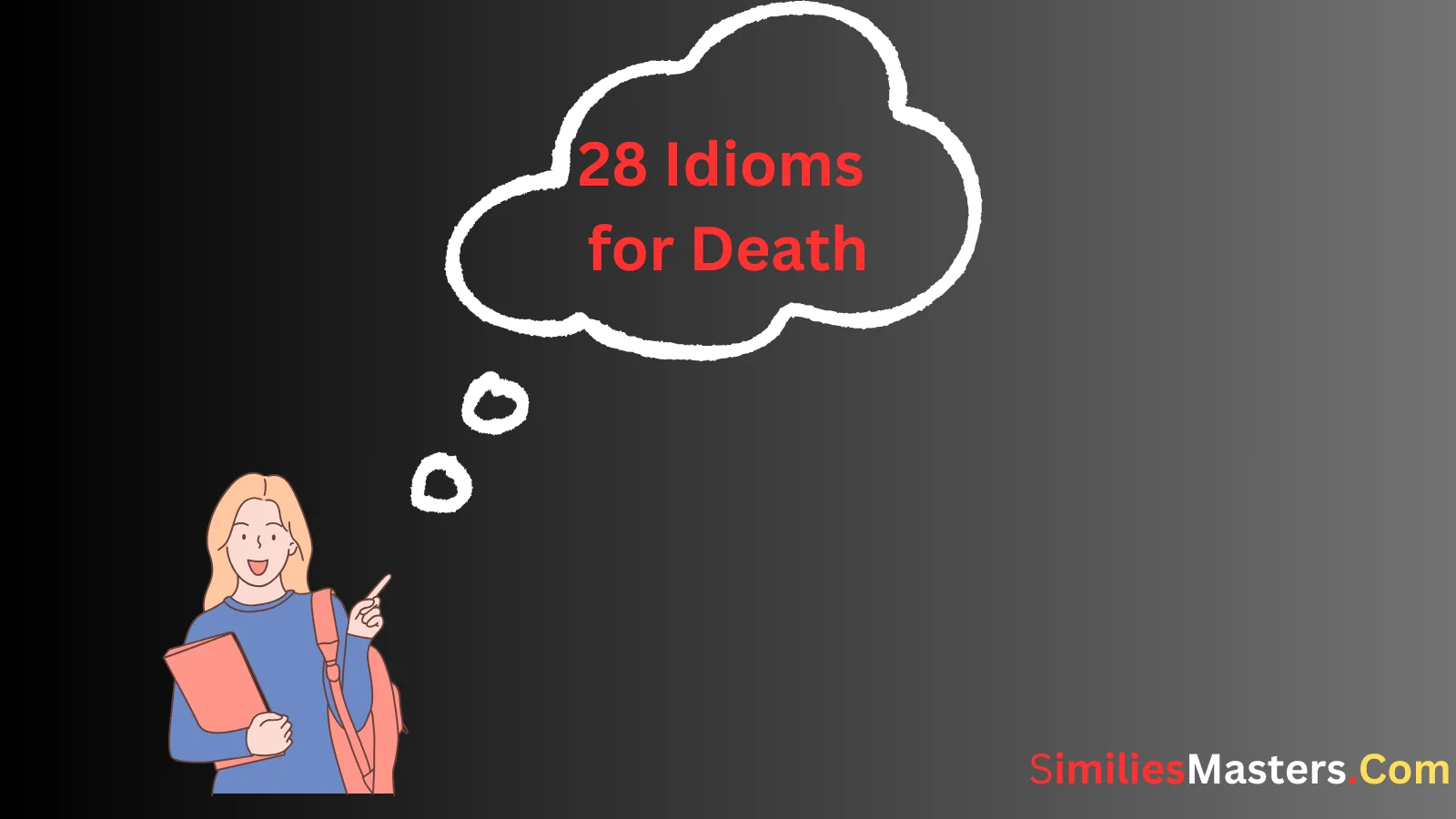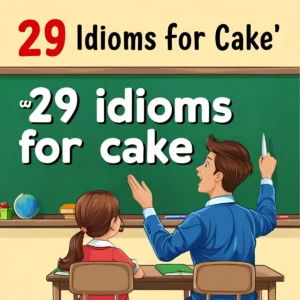Death is a sensitive topic, and over time, people have developed idioms to talk about it in a more poetic, respectful, or even humorous way. These expressions help convey loss, passing, and the end of life in different tones and contexts.
1. Kick the Bucket
Meaning: To die.
Example: “Sadly, my old cat kicked the bucket last night.”
Tone: Informal, humorous.
Other ways to say it: Pass away, bite the dust.
2. Bite the Dust
Meaning: To die or fail completely.
Example: “Many soldiers bit the dust in the battle.”
Tone: Casual, sometimes humorous.
Other ways to say it: Fall, perish.
3. Pass Away
Meaning: To die, said in a gentle way.
Example: “She passed away peacefully in her sleep.”
Tone: Respectful, soft.
Other ways to say it: Depart, move on.
4. Meet One’s Maker
Meaning: To die and go to heaven or judgment.
Example: “After a long illness, he finally met his Maker.”
Tone: Religious, serious.
Other ways to say it: Go to the other side, return to God.
5. Rest in Peace
Meaning: A phrase used to express condolences when someone dies.
Example: “May he rest in peace.”
Tone: Respectful, formal.
Other ways to say it: Sleep forever, eternal rest.
6. Six Feet Under
Meaning: Dead and buried.
Example: “If you mess with the wrong people, you’ll end up six feet under.”
Tone: Dark, serious.
Other ways to say it: Buried, gone.
7. Give Up the Ghost
Meaning: To die or stop functioning.
Example: “After years of illness, he finally gave up the ghost.”
Tone: Poetic, dramatic.
Other ways to say it: Breathe one’s last, fade away.
8. Cross the Rainbow Bridge
Meaning: A phrase often used when a pet dies.
Example: “Our beloved dog has crossed the Rainbow Bridge.”
Tone: Gentle, comforting.
Other ways to say it: Go to heaven, be at peace.
9. Pushing Up Daisies
Meaning: Dead and buried.
Example: “If we don’t find water soon, we’ll all be pushing up daisies.”
Tone: Humorous, dark.
Other ways to say it: Six feet under, gone.
10. Join the Choir Invisible
Meaning: To die.
Example: “The old poet has joined the choir invisible.”
Tone: Poetic, old-fashioned.
Other ways to say it: Pass on, be with the angels.
11. Cash in One’s Chips
Meaning: To die, referring to gambling.
Example: “He cashed in his chips after a long battle with illness.”
Tone: Casual, metaphorical.
Other ways to say it: Leave the game, check out.
12. Meet a Grim Fate
Meaning: To die in an unfortunate way.
Example: “The villain met a grim fate at the end of the movie.”
Tone: Serious, dramatic.
Other ways to say it: Come to a bad end, perish.
13. Go to a Better Place
Meaning: To die and go to heaven.
Example: “She’s no longer suffering; she’s gone to a better place.”
Tone: Comforting, religious.
Other ways to say it: Be with the Lord, enter paradise.
14. Lay Someone to Rest
Meaning: To bury someone after death.
Example: “We laid her to rest in the family cemetery.”
Tone: Formal, respectful.
Other ways to say it: Bury, say goodbye.
15. Sleep the Big Sleep
Meaning: To die.
Example: “After years of struggle, he’s sleeping the big sleep.”
Tone: Poetic, mysterious.
Other ways to say it: Eternal rest, never wake up.
16. Turn Up One’s Toes
Meaning: To die.
Example: “He turned up his toes at the ripe age of 90.”
Tone: Humorous, informal.
Other ways to say it: Kick the bucket, bite the dust.
17. Lights Out
Meaning: Death, usually sudden or unexpected.
Example: “One wrong move, and it’s lights out for him.”
Tone: Dramatic, serious.
Other ways to say it: Game over, the end.
18. The Final Curtain
Meaning: Death, referring to theater performances ending.
Example: “After a lifetime on stage, he finally faced the final curtain.”
Tone: Poetic, reflective.
Other ways to say it: The last act, the closing scene.
19. Ride Off Into the Sunset
Meaning: To die or disappear peacefully.
Example: “He finished his work and rode off into the sunset.”
Tone: Poetic, calm.
Other ways to say it: Retire, fade away.
20. Pay the Ultimate Price
Meaning: To die, especially in war or sacrifice.
Example: “Many soldiers paid the ultimate price for their country.”
Tone: Serious, honorable.
Other ways to say it: Sacrifice everything, give one’s life.
21. End of the Road
Meaning: The end of life.
Example: “He knew he had reached the end of the road.”
Tone: Metaphorical, reflective.
Other ways to say it: The final stop, life’s end.
22. The Big Sleep
Meaning: Death, referring to eternal sleep.
Example: “He’s gone into the big sleep.”
Tone: Mysterious, poetic.
Other ways to say it: Rest in peace, eternal slumber.
23. Take the Last Breath
Meaning: To die.
Example: “She held his hand as he took his last breath.”
Tone: Serious, emotional.
Other ways to say it: Breathe one’s last, exhale forever.
24. No Longer With Us
Meaning: A gentle way to say someone has died.
Example: “She is no longer with us, but her memory remains.”
Tone: Respectful, comforting.
Other ways to say it: Passed away, departed.
25. Gone Too Soon
Meaning: To die unexpectedly or at a young age.
Example: “He was gone too soon, leaving behind a grieving family.”
Tone: Sad, mournful.
Other ways to say it: Left too early, taken before time.
26. Answer the Final Call
Meaning: To die, often with a religious connotation.
Example: “He answered the final call and went to be with the Lord.”
Tone: Formal, spiritual.
Other ways to say it: Go to heaven, return to God.
27. The Inevitable End
Meaning: Death as something that comes to everyone.
Example: “We all must face the inevitable end one day.”
Tone: Philosophical, reflective.
Other ways to say it: Life’s final chapter, the last moment.
28. Return to Dust
Meaning: To die and decompose.
Example: “Ashes to ashes, dust to dust—we all return to dust someday.”
Tone: Poetic, spiritual.
Other ways to say it: Become one with nature, fade away.
Conclusion
Death is a universal reality, and these idioms reflect different cultural, emotional, and philosophical ways of describing it, from humorous to deeply respectful.



